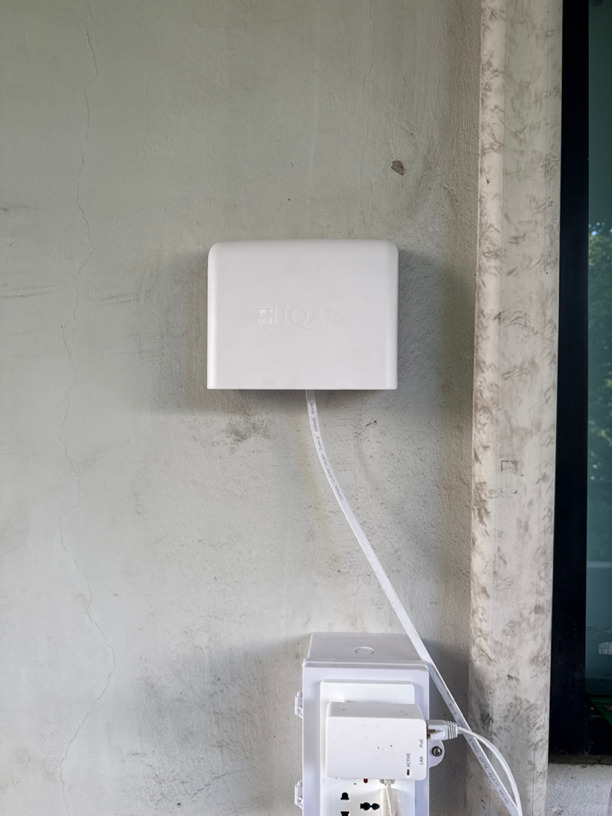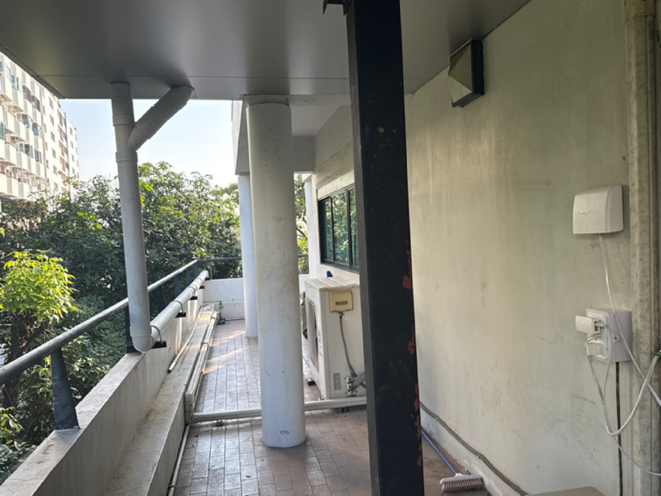Bangkok air quality map
Live air pollution map of Bangkok • 14.4M Followers • 23:00, Feb 23 Local time
Stations
Clean Air Facilities
Contributors
Government
4Diplomatic
2Non-profit
10Education
91Corporate
44Healthcare
3Hospitality
3Individual
146Top contributors in Bangkok
Who is sharing outdoor air quality data in Bangkok?
Featured station
Discover some of the best station installation in Bangkok



Station gallery

Intronics Research Centre, Bangkok
71
Newest stations deployed in Bangkok
AQI⁺ station rankingNewest stations
Learn more about global air quality
Learn more about air pollution in Bangkok
Is Bangkok a polluted city?
Bangkok, the capital of Thailand, is a very densely populated city, with over ten and half million people estimated to be living there in 2020, with a city size of 1,569 km². In 2019 the average reading of fine particulate matter in the air, or PM2.5, was found to be concentration of 22.8 μg/m3. This puts it at a ‘moderate’ rating according to the US Air Quality Index, which according to the stringent US standards of measurement, is any number between 12.1 to 35.4μg/m3. Observing data taken from 2019, the months of June through to August are the months that have the cleanest levels of pollution, with drastically lowered PM2.5 ratings.
Reasons for the lowered PM2.5 readings may be directly linked to seasonal influence, with the rainy season starting at around July and lasting till October. The rain offers a cleansing to the air quality as it naturally pulls the fine particulate matter and other pollutants such as nitrogen dioxide (NO2) and sulfur dioxide (SO2) out of the air.
However, despite the readings classing it at a moderate level, there are times when it crosses rapidly over this line to significantly worse pollution with levels of PM2.5 and other contaminants found lingering in the air. A large number of schools were closed in January of 2019, an unprecedented order at the time because the level of air quality has only something that has recently been made more transparent and available for the average citizen, as well as the government keeping a closer eye on it. The schools were closed in order to protect children from a particularly heavy haze that persisted for several weeks.
During this time, in the month of January during 2019, the levels of PM2.5 rose significantly higher than the rest of the year to a reading of 47.4 μg/m3, putting it in the ‘unhealthy for sensitive groups’ bracket of the US AQI. Whilst this presents significant health risks on certain demographics of people, including the young and elderly, as well as those with respiratory problems such as COPD (chronic obstructive pulmonary disease), Bangkok actually came in at a ranking of 48th most polluted city in the whole of Thailand, out of 68 cities recorded on the database. This may come as a surprise to many people, due to the extremely large number of vehicles on the road, the heavy tourism year in and year out (an industry that has come somewhat to a halt in the year of 2020 due to the outbreak of COVID-19). Many visitors and locals alike who have had to traverse the streets of Bangkok know how intense the pollution and haze can get, with visible smoke lining the air and thick black soot covering many of the city’s roadsides and underpasses.
Despite these discrepancies, Bangkok remains as its own entity, with a low ranking of pollution and PM2.5. Yet it is still capable of becoming rapidly more polluted in a very sudden manner, and as such visitors or residents should keep an eye on the air quality index rating, or the Bangkok air quality map, which shows live updates of the PM2.5 and other pollutant levels across the city. AirVisual’s air pollution app can help to provide live information and updates on such readings.
What causes deterioration of air quality in Bangkok?
There are many things that factor into the pollution levels in the city of Bangkok. The exhaust fumes from automobiles are among one of them, the burning of plants and other organic matter in the farming industry releasing its own fair share of smoke and volatile organic compounds (VOC's) into the air, in addition to the boating industry. Bangkok is tied together by a lengthy series of waterways and canals, that are imperative for the livelihood and travel of the city’s residents, as well as providing for many other industries such as tourism and travel, both touristic and residential commuting. It is estimated that over 300,000 boat trips are taken every single day (estimates taken at the beginning of 2020 before imposed lockdown).
The main issue within this industry is that these boats are powered primarily by diesel engines, which inevitably release large amounts of pollution and PM2.5 into the atmosphere, along with black carbon (BC), a dangerous pollutant formed from the incomplete combustion of various biomass and fossil fuels combined. This can take a heavy toll on the quality of the air, with even post COVID-19 readings pushing themselves dangerously high, a reading on the 10th of November 2020 coming in at 92 on the US AQI.
The deterioration is caused by the choking levels of traffic, both on the roads and on the waterways, the burning of agricultural material which releases large amounts of smoke and PM2.5 into the atmosphere, as well as pollution from factories and the industrial sector.
How can Bangkok’s air pollution be reduced?
For a start, the reduction in vehicle emissions would go a long way to reducing the overall level of pollution in Bangkok’s air and reducing its levels of PM2.5, as well as improving its air quality. Measures are already being taken to reduce the massive number of vehicles on the road at certain given times, but these measures are fairly transient and fail to put a dent into the long term AQI rating.
Many of the boats that populate the waterways release large amounts of pollution and PM2.5 and black carbon, and whilst Thailand and other neighboring Asian countries are on the brink of bringing their motorization rates to that of developed countries, there still remains to be a lack of strict fuel standards in regards to the quality of the fuel that is being used, with subsequent exhaust fumes exceeding what would be considered low-emitting standard.
Further measures to reduce the amount of pollution emitted from the burning of organic materials in the farming sector and other related industries would also go a long way, along with more stringent rules on the fume emissions from factories. As these three things are the main culprits in terms of contributing to the higher pollution levels and poorer air quality ratings, an implementation of stricter rules in the farming, vehicular and factory/industry sectors would be a good step to lowering air pollution emissions.
How does Bangkok’s air quality compare to other cities in Thailand?
According to the 2019 air quality index ratings of Thailand, it is shown that indeed Bangkok is significantly lower down on the list of most polluted cities. To give some examples of cities that have worse air quality or higher levels of pollution, the well-known city of Chiang Mai had an average PM2.5 rating of 32.3 μg/m3 as compared to Bangkok’s rating of 22.8 μg/m3. Chiang Mai saw PM2.5 ratings of 98.7 μg/m3 in March and 74.1 μg/m3 in April, ratings that catapulted it into the ‘unhealthy’ rating of the US AQI, far surpassing any readings taken in Bangkok during that year. By contrast the months of June through to August saw PM2.5 readings that fell into the WHO’s target rating of below 10 μg/m3, something that Bangkok failed to achieve throughout 2019. However, the months of March and April were high enough to give it a higher yearly average than Bangkok, in regards to its air pollution.
This gives one example of a comparison to other cities in Thailand, as can be found within IQAir’s 2019 World Air Quality Report. They follow a fairly thematic pattern of pollution spikes in certain months and drops during the rainy season, with variations of these numbers appearing across the 68 ranked cities.
What are the health impacts of pollution in Bangkok?
Numerous studies have been conducted on the effects of PM2.5 on the human body, and the results of being exposed to it over long periods of time. The other particulate matter of a larger size, of a width of 10 or less micrometers across (PM10), whilst larger than the more lethal PM2.5, are still small enough to enter via the respiratory tract and end up in the lungs, causing potential issues to both the lungs and the heart. PM2.5 on the other hand, being of a much smaller size (particles with a diameter of 2.5 micrometers or less) has the ability to not only get into the body via the respiratory tract, but can enter the bloodstream whereby they gain the ability to circulate to the rest of the body, causing much more adverse health impacts.
On a short-term basis, these health effects may include irritation to the eyes and nose, as well as the throat or other mucous membranes. PM10 can worsen cases of asthma, triggering attacks leading to other numerous forms of COPD. People with preexisting heart problems or diseases may find their condition worsening, with heart attacks or arrythmias (irregular heart beat) also possible.
Longer term exposure can lead to even more reduced lung function, or a worsening of COPD symptoms, as well as reduced life expectancy from the development of diseases affecting both the respiratory system and heart. PM2.5 cannot be easily removed from the body, if at all, making the need for the reduction of pollution and air filtration systems ever more important.
Commuting down the roads or waterways of Bangkok on a daily basis could have highly negative effects on a person’s health and a significant reduction in life expectancy, and as such mask use is recommended, as well as being aware of the pollution forecast and the daily levels of PM2.5 in the air.
Where is the cleanest air quality in Bangkok?
- Soi Kanda 133
- AISB. Campus2038
- Yannawa District38
- Minder Pathana Suksa School44
- Royal Park44
- Heinrich Boll Stiftung Southeast Asia54
- Kensington Learning Space54
- Sook Sumraan: Sun-Powered Boat55
- Wimalee Residence Bangmod55
- Grandio BangKhae56
- Kensington56
- Naradhiwas Rajanagarindra Road56
- RAJINI SCHOOL56
- Charter International School58
- Intamara 3758
- Outdoor School Bangkok (OSB)58
- Seri Village58
- Windshell58
- Bangkok Noi District59
- Lycee Francais International de Bangkok LFIB60
- Make It Pop Co., Ltd.60
- Masterpiece Rama960
- Resident Longcat Outbreak60
- Satit Chula Elementary School60
- 170 Sukhumvit8162
- AISB-Primary Campus62
- Bang Khae Phirom Park, Bang Khae District62
- Bangkok Tawiwit Bilingual School62
- Charan Mansion62
- MABIS62
- Raintree International School Sathorn62
- Thai Christian School 262
- The Star Estate62
- XCL ASB62
- Kasetsart university laboratory school 1, Chatuchak, Bangkok63
- Soi Ramintra 6263
- Soi Sukhumvit 31, High floor63
- The Lofts Asoke - sukhumvit 2163
- Assumption College Thonburi64
- Bangkok Christian International School 264
- Kensington International School - Primary64
- Ladprao 41 Yak 1464
- ListenField AirQ-Station64
- Metropark Condo Phase 164
- Punnawithi-CCRRRST64
- Saimai 5064
- Samrong Nuea64
- Shrewsbury City Campus64
- Suksawad14/1864
- TSM GROUP (Yot-Se)64
- Terd Thai64
- The Ritz-Carlton Residences (Outdoor)64
- UN Garden64
- Chom Thong65
- MI Home65
- Uno Solutions65
- Wachirabenchatat Park, Chatuchak District65
- ACACIA International Preschool Sathorn66
- ACACIA International Preschool Sukhumvit66
- Amnuaysilpa School66
- Baanploypoom Kindergarten66
- Bangkok River Park Condominium66
- Brighton College International School66
- Canvas 3966
- Garden International School Bangkok 266
- Hampton International Pre-School Sathorn66
- Joy Kindergarten66
- KARGO GLOBAL LOGISTICS66
- LIGMAN Lighting66
- La Petite Ecole - International School66
- Lakeside Villa 2 bangna66
- Narasiri Topiary Village66
- Navatanee Main Road66
- Patai Udom Suksa School66
- Phetkasem 3766
- Plearnpattana School66
- Pyve Ratchapruek Sirindhorn66
- Regent's International School Bangkok66
- Residence 4966
- Siam Hospital Supply Co., Ltd. - Building 166
- Soi Sailom 166
- Suan Luang66
- Sukhumvit 33 - Limtanakool Family66
- Suwannaramwittayakom school 1, Bangkok Noi, Bangkok66
- TSI International School (Bearing Campus)66
- [Wellington College] Junior School Entrance66
- Anglo Singapore International School Campus 3167
- Bangkok Boulevard Rama967
- De Botan Srinakharin67
- Jitimont Residence67
- KIDSBangna67
- Raintree International School Sukhumvit67
- Saphan Sung District67
- SummerDash67
- Thai Christian School 167
- 19-51 Soi Sangchai68
- AirVisual-TJAS68
- BASIS International School Bangkok68
- Beaconhouse Yamsaard International School68
- CCSup68
- COM7 PUBLIC COMPANY68
- Centro Bangna-Wongwaen68
- Club6668
- Ekkachai 868
- Embassy of Belgium68
- Fouart (1994)68
- GFC Fertility Clinic Rama368
- HOOK.CO.TH68
- Hyundai Rama968
- Khlong San68
- Krisda2168
- LIGMAN Lantern Building Floor 268
- Ladprao 6468
- Learn Satit Pattana School68
- MANA Specialty Coffee ข้างรพ. วิชัยยุทธ68
- MK Restaurant Group Public Company Limited68
- Manthana Lake Watcharapol, Saimai68
- MdOubleO Premium Home68
- Millenium68
- NIVA AMERICAN INTERNATIONAL SCHOOL68
- Nana Nue Pier68
- Nawamin68
- Near Fashion Island 268
- Neurological Institute of Thailand68
- On Nut 8068
- Pan-Asia International School68
- Parntawan Kindergarten68
- Prom School 268
- Ram Inthra 968
- Robin Extend68
- SENA NIWET SOI 21468
- STOCK EXCHANGE OF THAILAND68
- Soi Meathinivase68
- Srithaigranites (ศรีทัยแกรนิต)68
- St Andrews international School Bangkok High School Campus68
- St Andrews international School Bangkok Primary School Campus68
- St. Andrews International Schools Sathorn68
- St.louis Grand Terrace68
- Thanathamrong Village68
- The Athenee Hotel68
- Thian Thale68
- Vespiario Company Limited68
- WC House68
- AISB Highfield69
- Aster International School69
- Baan Ladprao69
- Bang Khae District69
- Bangkok Hospital69
- Bangkok International Christian Nursery BICN69
- Bangkok Prep69
- Berkeley International School 369
- Brighton College69
- Burasiri Watcharapol69
- Chartered Square Building69
- Chuanchuen Parkville69
- Esta Home Private Park69
- Grand Bangkok Boulevard Sukhumvit69
- Huai Khwang District69
- IQAir Thailand - Vibhavadi 2269
- LADAWAN RAMA269
- Laddarom Elegance Rama 269
- Ladprao 112 Gardenview69
- Lat Phrao Soi 1 Yaek 2169
- Little Treehouse Nursery Thonglor69
- Mu Ban Nanthawan Onnut 4469
- NARASIRI KRUNGTHEP KREETHA69
- NAVARA RAMA 269
- Nantawan Ram 9469
- Nantawan Sathorn Ratchaphruk69
- Ngam Wongwan 45 (N.Team)69
- Noddy by Elizabeth Preschool69
- Oleander Soi11 BKK69
- PATTARA HQ69
- Plus City Park69
- RePower69
- Rouy-aree Residence 269
- SRICHAND แป้งฝุ่นโปร่งแสง กัน PM2.569
- SaiThong Ratchada 3669
- Sasin School of Management69
- Satit Chula Secondary School69
- Satri Witthaya 2 Soi 2969
- Setthasiri Charan-Pinklao69
- Setthasiri Pattanakarn Soi 669
- Showpow Bike Shop Onnut 46/269
- Siam Hospital Supply Co., Ltd. - Building 669
- Siamsaamtri School69
- Singapore International School Thonburi69
- Sukkai Sabaijai Pharmacy - PTT RR69
- TSI International School (Wongwianyai Campus)69
- The Room Sukhumvit 62 Condo69
- The Sukhothai Bangkok69
- VPPW Office MD69
- Visit home69
- Watpakbor sc out69
- piya home69
- Din Dang70
- 276/137 Manthana Srinakarin-Romklao71
- Ascot International School71
- Bang Bon District71
- Bangkapi District71
- Bangkok Christian College -BCC15071
- British Columbia International School Bangkok71
- British Mandarin School (BMIS)71
- CVNART Sukhumvit 7/171
- Cafe Velodome71
- Chai Charoen Supplies Company Limited71
- Embassy of Switzerland71
- FSB International School71
- Fullerton Sukhumvit71
- Garden71
- Intronics Research Centre71
- Kids' Academy Discovery Campus71
- Life Bangkok Boulevard71
- MANTANA Bangna Wongwaen71
- Na Daroon School71
- Navatanee Soi 471
- Owat Maid71
- PSP Demonstration School71
- Phrom Si 271
- Prukpirom Sathorn - Ratchaphruek71
- Putthabucha1571
- River House71
- Rojjirapa Kindergarten71
- Roong Aroon School71
- SPIP71
- STGK Suanpak71
- Sathorn Tai Road71
- School Gymnasium71
- Sertsiri Village71
- Siripen School71
- Soi Ngamwonwan near the Ministry of Health71
- Suanplibai71
- Thai Airways Head Office71
- The Privatier Ratchada 3271
- Fortress area of enemies defeated72
- Khu Khot72
- Santiphap Park, Ratchathewi District72
- Soi Rimthang Rotfai 372
- BAFS-DMK73
- Bang Bon 5 Market73
- Bangkok Christian College - Sirinart73
- Centro Rama9 Krungthep Kreetah73
- Dcondo tan73
- Donmuang hotel73
- Dusit District73
- GUB73
- Garfield @Grand Britania73
- Golden Lanna, Ramkamheang 9273
- Heathfield International School 273
- Hummingbird Inter Kindergarten73
- JANANAN Outdoor73
- Kamnan Maen 20 Alley73
- Kanchanaphisek sai2 park73
- LPN Rama 4 - Kluaynamthai73
- Ladawan Kaset Nawamin73
- Lakeside Villa II73
- NAWAMIN ROAD73
- On-Nut 65 Alley73
- Park Silom73
- Pattanakrn Soi 7473
- Phahon Yothin 7273
- Phatthanakan Soi 3273
- Piyanon Village73
- Private Village73
- R Plus Clinic73
- RIS Early Years Campus, Prayasuren Rd. (Outdoor)73
- Ramintra Sports Park, Bang Khen District73
- Rangsit - Nakhon Nayok 2573
- Regents Langsuan73
- Rommanee Park, Thung Si Kan, Don Mueang District73
- SAI 2 SOI 3373
- Sindhorn Offices73
- St. Andrews Dusit AQI73
- St. Andrews International School Sukhumvit 10773
- The Nest House, Bang Kachao73
- The Practical Solution PLC73
- The Residents at Sindhorn Kempinski73
- Tim+’s Home73
- Tiny's house73
- Traill International School 273
- Trisak Automation73
- WachirathamSathit 2373
- Wat Wimutayaram School73
- [Wellington College] Senior School Entrance73
- Her Majesty the Queen's 60th Birthday Anniversary Park, Lat Krabang District74
- AISB Innovation Centre75
- Akedarun School sai 4 road75
- Aon's house75
- Areeya The Colours 275
- Crescent International School75
- Don Mueang District75
- KAEGOOGLE75
- KPI Tower (Outdoor)75
- Kids Kingdom International Kindergarten 375
- Ladawan Ratchpruk-Pinklow75
- Ladprao 35 Yak 2-375
- Lets Asia75
- Manthana (Onnuch-Wongwan 3)75
- Mena Cosmetics (HQ)75
- Nong Khaem Southeast Asia University75
- Park Heritage Phatthanakan75
- Prinn Sathorn Ratchapruk75
- Rangsiya Village75
- Salanamron Market75
- Setsiri 2 RD75
- Setthasiri Changwattana Prachachuen275
- Soi Samahan75
- Southeast Asia University75
- TDRI 275
- TawanMcweis Latprao Soi 1575
- Tiensuan Estate75
- Wattana Wittaya Academy75
- Circle Living Prototype76
- Wattana District76
- 15 Sukhumvit Residences77
- 252 HOME77
- Annabel’s Early Years77
- Bansomdejchaopraya Rajabhat University77
- Casa viva Condominium77
- Enrich Park77
- Kids Kingdom Ruamrudee International Kindergarten77
- Ladphrao District Office77
- Lat Phrao District77
- NOBLE WANA WATCHARAPOL77
- Navathanee Residence77
- Newton Tower77
- Panya Village P1 7/177
- Phasi Charoen District77
- Phaya Thai District (Khor Por Station)77
- SCG Headquarters Bangsue77
- SJP Information System Co., Ltd. - Office77
- Samakkee 60/177
- Silpakorn University77
- Singapore International School of Bangkok77
- Sumrae77
- Sunshine engineering and construction co.,ltd.77
- Thawsischool77
- The area of Nakhon Luang Concrete Co., Ltd., Bangna District77
- Town Plus77
- Wisdom Nebulae Montessori School77
- Yannawa District (Khor Por Station)77
- Baan-Suan Tha-Phra78
- Canadian International School of Thailand78
- King’s College International School78
- Lumpini Park, Pathumwan District78
- New Bambino International Kindergarten78
- Pattanakarn 20 yaek 678
- Prinyada Kaset-Nawamin78
- Setthasiri Charan-Pinklao278
- Smile and Shine Dental Clinic78
- So Origin Phahol 69 Station78
- Sudjitnivet Village78
- The Tiny Seeds International Pre-School78
- Yip In Tsoi Group78
- Ban Rim Num Condo, Chaophya Hospital79
- Bang Khen District Office79
- Dental Click(outside)79
- I.C.C. INTERNATIONAL Co.,Ltd.79
- Interkids Seri thai79
- Rat Burana District79
- Samphanthawong District79
- Sittarom Regent Sri Nakarin Village79
- Thonburi79
- Thung Khru District79
- Wake and Grow Coffee - Suanluang Rama979
- soi Phrapinij, Narathiwat Road79
- BERKELEY KINDER80
- Baan Thapra80
- Bangna District (Khor Por Station)80
- Bodindecha Sing Singhaseni School80
- Borahome (Ekkamai 22)80
- Brighton College International School Bangkok Vibhavadi80
- Bueng Kum District80
- Data Entry Group80
- Energy Complex80
- Glory Singapore International School Ramintra80
- Khlong Sam Wa District80
- Kids’ Academy International School Srinakarin80
- Min Buri80
- Nonsi Witthaya School80
- Siri Sukhumvit Soi 881
- 6th Ave. Sukhumvit 1582
- Bang Khen District82
- Bang Khun Thian District (Khor Por Station)82
- DenlaKindergarten82
- IDEO Ratchada-HuaiKhwang82
- Khan Na Yao District82
- Panyarat High School82
- Pathumwan District (Khor Por Station)82
- Pruksa Ville 98 Village82
- SYSTEMS DOT COM82
- Wang Thonglang District (Khor Por Station)82
- Anglo Singapore International School Campus 6484
- Bang Khun Thian District84
- ELIO DEL RAY84
- Kikiriri at DMK84
- National Housing Authority Dindaeng84
- Thon Buri District (Kor Por Station)84
- Phaya Thai Station85
- Taling Chan District85
- Chatuchak Station86
- Homeplace Village86
- Sathorn District86
- Bang Phlat District87
- Central Chest Institute of Thailand88
- Lat Krabang88
- Phra Nakhon Station88
- SC Asset – Shinawatra Tower lll (Headquarter)88
- Sukkai Sabaijai Pharmacy - HQ88
- Army Apartment Sam Sen89
- CSPM Thailand89
- Ekamai International school89
- Pracha Niwet Natures Garden89
- Bangkok Yai District90
- Bangna District90
- Tha phra Intersection90
- Chaidee Mansion Sukhumvit 1191
- Glory Singapore International School 291
- Bang Sue District92
- Khlong Toei District92
- Nong Chok District92
- Pathumwan District92
- Wang Thonglang District92
- 333 Riverside95
- LangHongGold HQ Yaowarat95
- Suan Sayam-Ram Intra Intersection95
- UTCC Library95
- 456 Krisadanakorn Pinklao97
- OR PKN97
- Lak Si District99
- Bang Rak Lovely Plaza100
- Bangrak100
- Sangkha Santi Suk Road145











